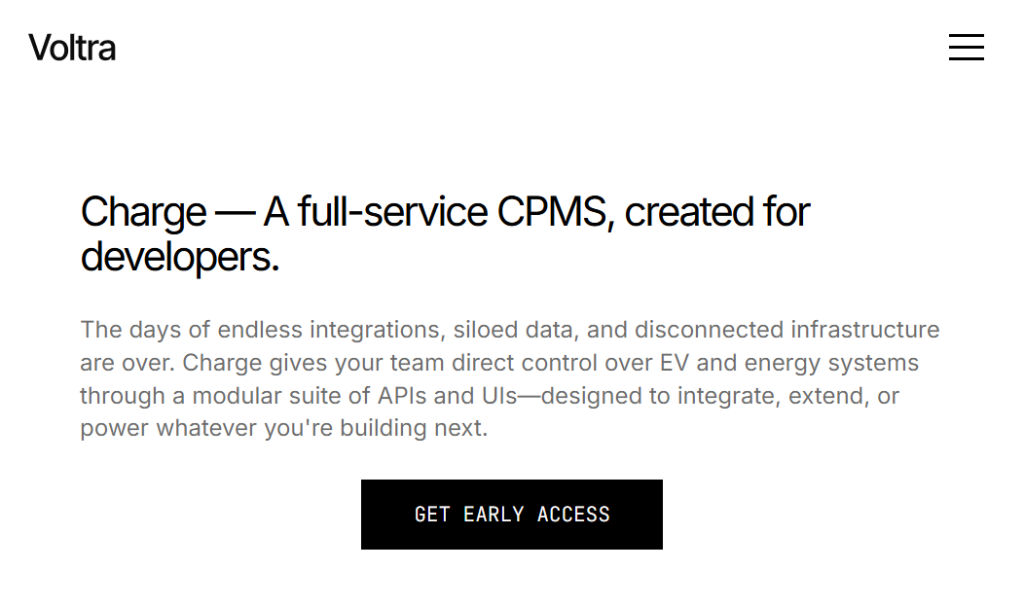Voltra Raises $1.8M in Pre-Seed Round to Revolutionize EV Charging Infrastructure
July 19, 2025
byFenoms Start-Ups

Voltra, a pioneering startup focused on developer-first EV charging software, has announced the successful closing of its $1,800,000 Pre-Seed funding round. The round was backed by investors Contrary, Hanover Capital, and Velocity Fund, marking a strong vote of confidence in Voltra’s mission to reshape the digital foundation of the electric vehicle (EV) infrastructure ecosystem.
This funding round will accelerate Voltra’s product development and go-to-market efforts for its Charge Platform Management System (CPMS) - a modular, API-first solution for managing and integrating EV charging systems.
A Unified Platform Built for EV Developers
Voltra is tackling a major pain point in the EV ecosystem: the fragmented, legacy software powering modern charging infrastructure. Their flagship solution, Charge, is a comprehensive CPMS designed for developers, offering end-to-end control over EV hardware, data, billing, and energy flows.
“We believe the future of EV infrastructure must be developer-centric, interoperable, and API-native,” said Alexander Stratmoen, CEO and Co-founder of Voltra. “Our platform empowers teams to integrate, scale, and build faster.”
Unlike conventional charging network backends - which are often siloed, difficult to extend, and plagued by integration headaches - Voltra’s CPMS acts as a modular suite of APIs and user interfaces, enabling teams to build highly customizable EV experiences.
Why the EV Charging Industry Needs a Platform Shift
The need for a smarter, more cohesive backend for EV infrastructure is urgent. According to BloombergNEF, there will be more than 77 million EVs on the road globally by 2030. However, the underlying charging network software remains an operational bottleneck for scaling this vision.
The global EV charging infrastructure market is expected to reach $147 billion by 2030, growing at a CAGR of over 30%, according to Grand View Research.
Yet, most CPMS platforms today are:
- Tightly coupled with proprietary hardware
- Difficult to integrate into smart grid systems
- Lacking open developer tooling
This is where Voltra sees its opportunity: providing a fully customizable, cloud-native layer that brings modern software principles to a traditionally hardware-dominated space.
The Core of Voltra’s Product Strategy
Voltra’s platform introduces the following key innovations:
- Modular APIs – Teams can select only the features they need: charging session logic, telemetry ingestion, billing, remote control, etc.
- SDKs and Webhooks – Designed for quick integration into existing apps or hardware systems
- Real-time data architecture – Enables actionable insights across charging locations and vehicles
- Secure, scalable cloud-native foundation – Ideal for fleets, OEMs, energy providers, and fast-growing charging networks
Here’s a pivotal insight that’s critical for founders in EV infrastructure: the competition in this space is no longer about who builds the most hardware. It’s about who can orchestrate the most developer-friendly, interoperable digital ecosystem.
And here’s where many startups get stuck: they treat software as a wrapper for hardware instead of the driver. But in reality, the CPMS layer is where defensibility, network effects, and data flywheels are created. It’s where pricing logic, fleet routing intelligence, grid load balancing, and user behavior data converge. The companies that design this middle layer as an extensible platform - not a closed box - will be the ones who own the infrastructure narrative over the next decade.
Voltra’s thesis isn’t just to build the backend - it’s to become the Stripe or Twilio of EV charging, abstracting away complexity and making it drop-dead simple for developers to control every piece of the stack, from hardware to billing to analytics.
Backed by Strategic Investors
Voltra’s cap table is stacked with backers who understand both the technical complexity and the market opportunity:
- Contrary – A prominent investor known for supporting engineering-led founders
- Hanover Capital – Brings deep expertise in energy markets and mobility
- Velocity Fund – Focused on early-stage innovation across climate and software
These investors are betting not just on the product - but on the future of modular, software-defined EV infrastructure.
“The Voltra team has a unique understanding of the convergence between software, mobility, and energy,” said a partner at Contrary. “We see Charge as an essential enabler for the next generation of EV products.”
Competitive Positioning in a Growing Market
While other CPMS vendors focus on legacy networks or closed OEM platforms, Voltra is laser-focused on:
- Developers who want freedom from vendor lock-in
- Fleets looking for highly customizable charge orchestration
- Utilities integrating EV loads into grid infrastructure
- Emerging charging startups building with speed and flexibility
Voltra’s open architecture enables:
- Rapid deployment of charging solutions
- Seamless integration with mobile apps and energy dashboards
- Data unification across charging brands and types
This gives them an edge in serving modern businesses who want programmable control over every part of their EV infrastructure.
What’s Next for Voltra
With its fresh Pre-Seed capital, Voltra plans to:
- Grow its engineering and DevRel teams
- Launch private beta access to the CPMS platform
- Expand partnerships with OEMs, charge point operators (CPOs), and fleet providers
- Build open-source connectors and SDKs to broaden community adoption
The roadmap is focused on positioning Voltra as the go-to developer stack for EV charging - allowing any company to integrate, manage, and evolve their charging systems without starting from scratch.
The Software Layer the EV World Needed
Voltra’s raise is more than a typical Pre-Seed story. It reflects a deeper shift in the EV space - from hardware-centered rollouts to software-driven orchestration. As more businesses seek to manage their charging infrastructure like cloud systems, Voltra is emerging as the essential developer toolset for that future.
This round validates that Voltra isn’t just building tooling. It’s building infrastructure for the next era of clean mobility.









